This blog post was written by NCTE member Nawal Qarooni. It is part of Build Your Stack®, an NCTE initiative focused exclusively on helping teachers build their book knowledge and their classroom libraries. Build Your Stack provides a forum for contributors to share books from their classroom experience; inclusion in a blog post does not imply endorsement or promotion of specific books by NCTE.
I have always contended that picturebooks are perfect for all ages, and never has this been truer than with the beautiful texts being published today. There are picturebooks that grapple with all sorts of heavier topics, tackling, for instance, grief, loss, pain, and perseverance. Sometimes, these picturebooks deal with such emotions underlyingly, sharing with children how to navigate the inevitable rises and dips we experience. At other times, picturebooks are less symbolic, but rather stark, raw, and direct.
The following picturebooks are ones I’ve used to generate compassionate and caring conversations with children of all ages, alongside their caregivers. In family literacy lab sites, which are at the heart of much of my literacy work in schools, I share these texts with children to springboard discussions about their own lives, thoughts, and feelings.
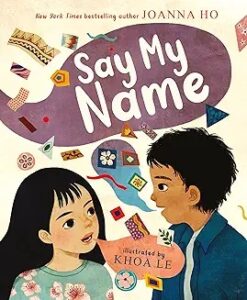 Say My Name by Joanna Ho, illustrated by Khoa Le
Say My Name by Joanna Ho, illustrated by Khoa Le
I love this picturebook that shares the backgrounds and stories of so many children across the globe, weaving histories with their futures, as connected by their beautiful names. When I was a child, my name was often mispronounced in school, and I didn’t have the language or confidence to not only correct the pronunciation but also share why my name was meaningful and important. This book supports conversations with children and families about why it’s so important to know how name stories connect us to our ancestry and also our promises of knowing ourselves moving forward, with each step in the world. My favorite part might be the spread that reads, “My name is Bijan Hosseini. Once a jewel cradled in my mother’s arms, I look to Allah for guidance and walk with angels over my shoulders and prayers to sustain my steps,” because it was so rare that I encountered Persian characters when I was young, and I love that the children of today now have this mirror. Each character in the text comes from a different background, and the meanings and pronunciations of their names are explained at the end of the text. I’ve used questions for children and caregivers such as the following:
- How does it make you feel when your name is mispronounced?
- How do you feel when you don’t know how to pronounce someone’s name?
- What does your name mean?
- Who named you?
- What legacy does your name carry?
Desert Queen by Jyoti Rajan Gopal, Illustrated by Svabhu Kohli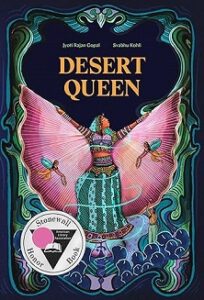
This beautiful book tells the story of drag performer Queen Harish, who was also known as the “Whirling Desert Queen of Rajasthan.” During the day, Harish, a boy, is weighed down by grief and worry, caring for his sisters. When Harish Kumar is performing, she is vibrant, feminine, and glittery—and feels free. The story is rife with lyrical prose, but it’s based on a true story—one that the author learned after meeting Queen Harish at a concert in Rajasthan, India. The illustrations alone are gorgeous conversation starters, as the simple sentence stems “What do you see? What do you notice? What do you wonder?” elicit commentary and questions from children and allow for families to answer questions honestly about what they see on the page. The illustrations include patterns and motifs rooted in the city of Jaisalmer, Indian cultural heritage, forts, textiles, and murals in the city, all of which lends itself to thoughtful conversation about similarities and differences among landscapes in our world. More than anything, perhaps, this book lends itself, with emotionality, to conversations about compassion and care for ourselves and our communities, allowing for all to show up exactly as they are.

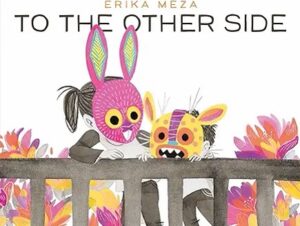 To the Other Side by Erika Meza
To the Other Side by Erika Meza
This book is a stunning depiction of a young boy and his sister who have left home to cross a border on a dangerous trek that highlights the terrifying and emotional experiences of refugee children. It’s such an important story. As the children who cross the border pretend they’re playing a game, they imagine what’s waiting for them on the other side. The images alone, which author Erika Meza also created, lend themselves to compassionate and caring conversations with children and families. There are images in black and gray, and there are those in color; there are monsters with teeth, and there are masks covering faces. Children can infer the emotions of the migrant and refugee children without reading the words. Families and educators can readily talk of the Rights of the Child and communities of care and allow children to express their feelings about what it means to be safe.
Just Like Grandma by Kim Rogers, illustrated by Julie Flett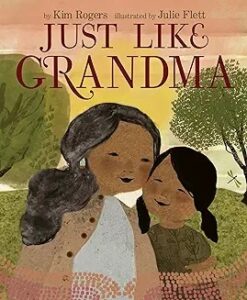
I’m thrilled to have this text to share about familial connection to our grandparents and other elders in our community, as I was raised respecting older generations and the lessons they teach us. This story connects Becca and her grandmother in all sorts of learning, from moccasin beading to basketball playing to dancing like the beautiful butterflies. Underlying Becca’s desire to be just like Grandma is her grandmother’s desire to be just like Becca, raising questions about coveting youth and wanting to feel forever young. In caring conversations with children and families, I ask questions that springboard conversation, such as these:
- What do you like to do with your grandparents or folks from older generations in your caring circle?
- What do you wonder about their experiences when they were young?
These questions inevitably lead to conversation about who the people are in our constellations of care who support us, whether they be blood relatives or not, being cognizant that plenty of people who are chosen family or connected in other forms of kinship contribute meaningfully to our lives.
NCTE and independent bookstores will receive a small commission from purchases made using the Bookshop.org links above.
 Nawal Qarooni is a Jersey City–based educator, adjunct professor and writer who supports a holistic
Nawal Qarooni is a Jersey City–based educator, adjunct professor and writer who supports a holistic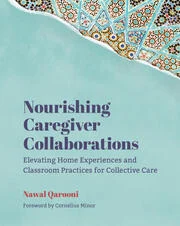 approach to literacy instruction spaces across the country. Drawing on her work as an inquiry-based leader and as a mother, Nawal’s pedagogy is centered in the rich and authentic learning all families gift their children every day. She is the author of Nourishing Caregiver Collaborations: Elevating Home Experiences and Classroom Practices for Collective Care, which connects home and school experiences to elevate the natural ways that families already grow their children’s literacy lives. She also serves on the Library of Congress Literacy Awards Advisory Board and the Reese Witherspoon LitUp Committee. You can learn more about her work at NQCLiteracy.org and follow her at nqarooni on Instagram and Threads and at NQCLiteracy on X.
approach to literacy instruction spaces across the country. Drawing on her work as an inquiry-based leader and as a mother, Nawal’s pedagogy is centered in the rich and authentic learning all families gift their children every day. She is the author of Nourishing Caregiver Collaborations: Elevating Home Experiences and Classroom Practices for Collective Care, which connects home and school experiences to elevate the natural ways that families already grow their children’s literacy lives. She also serves on the Library of Congress Literacy Awards Advisory Board and the Reese Witherspoon LitUp Committee. You can learn more about her work at NQCLiteracy.org and follow her at nqarooni on Instagram and Threads and at NQCLiteracy on X.
It is the policy of NCTE in all publications, including the Literacy & NCTE blog, to provide a forum for the open discussion of ideas concerning the content and the teaching of English and the language arts. Publicity accorded to any particular point of view does not imply endorsement by the Executive Committee, the Board of Directors, the staff, or the membership at large, except in announcements of policy, where such endorsement is clearly specified.

